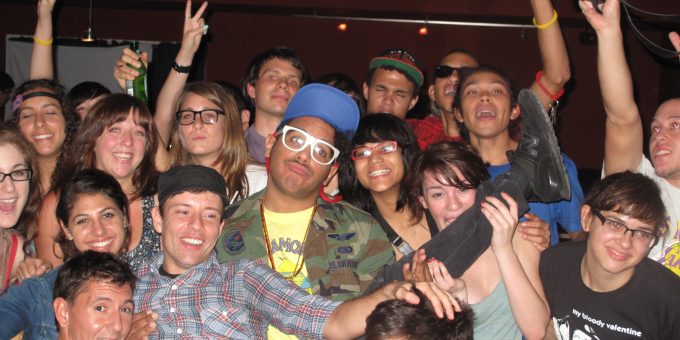
Partying is "built into the rhythm and architecture of higher education." Photo by Incase, Flickr CC https://flic.kr/p/7okfcq
Which College Students Are More Permissive about Sex? Differences by Social Class Background and Educational Aspirations
According to a recent study of college students by Elizabeth A. Armstrong and colleagues, some young women from working class backgrounds see their affluent counterparts as “rich bitches” who hook up and have sex all the time. Exhibiting the opposite stereotype, the same study found that some women students from affluent backgrounds call their working-class counterparts “trashy,” while they see themselves as “classy.” While the affluent women’s judgments are based mainly on clothes and makeup, the women also assume that those who are “trashy” have sex more than those who are “classy.”
Besides social class background, a person’s educational aspirations may play a role in their attitudes about sex, or their sexual behavior. Popular stereotypes are present here as well. For example, one often hears about “brainiac” or “nerdy” guys who rarely have sex, because they aren’t seen as “cool” enough to find partners. Some people also believe that women who aspire to excel in school refrain from sex to avoid potential pregnancies or serious relationships that would jeopardize finishing their degree.
Are any of these stereotypes is actually true? Are students from more advantaged backgrounds more restrictive or more liberal regarding sexual attitudes and sexual behavior? Or, is social class irrelevant to sex in college? And how do educational aspirations play a role in both sexual attitudes and behavior for college students today?
To answer these questions, we use data from a survey of 21 colleges and universities in the United States. We examine how sexual attitudes and behaviors are related to two measures of background or prospective social class—the educational attainment of students’ mothers, and the students’ own educational aspirations.
What We Did
We use data from the Online College Social Life Survey (OCSLS), a survey of over 20,000 students at colleges or universities in the United States. For our measure of social class background, we use a question about how much education the student’s mother has, broken down as follows: high school or less, some college, Bachelor’s degree, or graduate degree. For our measure of educational aspirations, we use a question about how much education the student intends to complete, which we classify as: Bachelor’s degree or less, Master’s degree, and a highest category that includes MD, JD (Law), and PhD. We examine how these two measures (mother’s education and the student’s educational aspirations) are related to sexual attitudes and behaviors.
Sexual Attitudes
To analyze respondents’ beliefs about what sexual behavior is wrong and what is okay, we analyze responses from the following questions:
1) If a man and a woman have sexual relations before marriage, do you think it is wrong?
2) What is your opinion about sexual relations between two adults of the same sex?
For each of these two questions, we divided students into two groups—those who chose “not wrong at all,” the more permissive answer, and those who took the more restrictive view that premarital sex or same-sex sex is always, almost always, or sometimes wrong.
For the other attitudinal items, respondents were asked if they strongly agree, agree, disagree, or strongly disagree with three statements. We divided them into a more permissive group who disagreed or strongly disagreed, and a more restrictive group who agreed or strongly agreed. These questions are:
1) I would not have sex with someone unless I was in love with them.
2) If women hook up or have sex with lots of people, I respect them less.
3) If men hook up or have sex with lots of people, I respect them less.
(The last two items were placed 16 items away from each other to encourage respondents to think about them separately.)
Sexual Behaviors
We also include three measures of sexual behavior, which are as follows: 1) the respondent’s number of hookups while in college; 2) the respondent’s lifetime number of sexual intercourse partners (a measure that we realize excludes some same-sex partnerships); and 3) whether the student has ever had sex outside an exclusive relationship. (“Sex” was not defined in the question, but based on our informal discussions with students, we believe that heterosexual students usually interpret it to mean intercourse.)
The tables at the end of this post provide the percent or number who had a particular attitude or behavior, separately by each category of the social class measure. These percents or numbers have been regression-adjusted to take out any part of the class difference in sexual attitude or behavior that stems from class differences in age, race/ethnicity, whether the student is an immigrant, or interaction of race/ethnicity and immigrant status. That is, these percents or numbers are predicted values from a regression predicting the attitude or behavior from mother’s education or educational aspirations, and this regression model also contained controls for age, race/ethnicity, immigration status, and the interaction of race/ethnicity and immigration status. In models where the predictor of interest is the students’ educational aspirations, we also controlled for mother’s education, so that any association we detect would not be merely be an indirect effect of mother’s education, through its effect on their children’s educational aspirations. For more details on our models, see the Technical Appendix at the end of this post. In the graphs below, as well as in the table in the appendix, asterisks by a percent or number indicate that it is significantly different from the percent or number for the lowest category of mother’s education or student’s educational aspirations.
Mother’s Education and Sexual Attitudes
Women whose mothers have more education have more permissive attitudes on all of our attitudinal measures except one, although many of the differences are modest in size. The item on which there is no significant difference between women whose mothers have high or low education is whether the respondent disrespects men with many sexual partners; groups vary between about 69% and 72%, with no differences significant and no clear order to the percents. The graph below shows the significant differences for the other items. First, women whose mothers have a graduate degree are somewhat less likely to think that premarital sex is wrong, compared to women whose mothers have no more than a high school degree—29% compared to 34%. Women with higher mother’s education are also more permissive about having sex without love; among those whose mothers have a graduate degree, 48% believe that love is necessary in order to have sex, and a slightly higher (51%) of those whose moms have no more than a high school degree say this. As for disrespecting women who hook up a lot or have sex with many people, 56% of those with the most highly educated moms agree, while 60-61% of those in each other category agree. Overall, while the differences are modest in size, the graph below shows that the higher a woman’s mother’s education, the more permissive are most of her sexual attitudes.
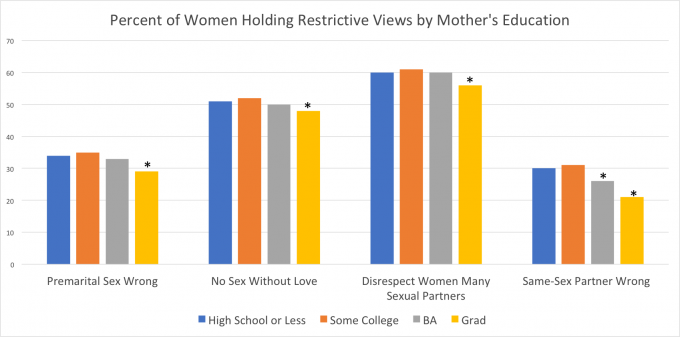
For men, their mother’s education has no clear effect on whether they say that they would not have sex without being in love (the most restrictive men are in a middle category). Also, there is no significant relationship between their mother’s education and whether men disrespect other men who hook up and have sex a lot; while men are much more tolerant of male “players” than women are, these attitudes don’t differ by class for either men or women. But on the other three items, men with more educated mothers have less restrictive attitudes, as the graph below shows. Only 28% of men whose mothers have graduate degrees think premarital sex is wrong, compared to 32% of men whose mothers finished only high school. In addition, men with the most educated mothers are the least likely to disrespect women who hook up or have sex a lot; this is true for 62% of them, compared to 68% of men with the least educated mothers. Finally, there is a large difference by men’s class background in whether they think that sex between same-sex partners is wrong; 31% of men whose mothers have a graduate degree think it is wrong, compared to 48% of men whose mothers have no more than a high school degree. Overall, as we saw for women, and as the graph below shows, men with more educated mothers have less restrictive attitudes about sex.
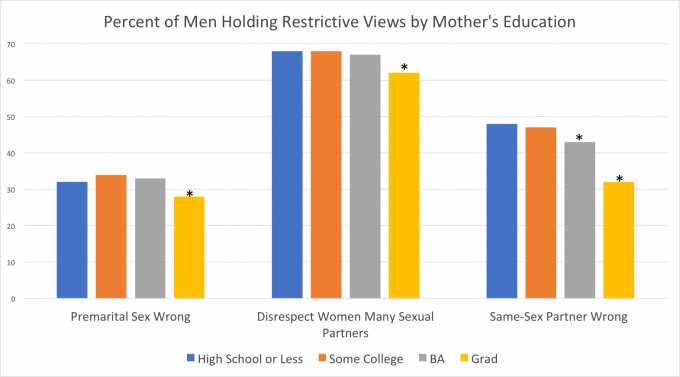
Educational Aspirations and Sexual Attitudes
We saw above that those with more educated mothers have modestly more permissive sexual attitudes on most items. This is not the pattern for women’s own educational aspirations; there is no clear pattern for those aspiring to more education to have more permissive attitudes, except on one item; slightly fewer women who aspire to a PhD, MD, or JD disrespect women with many partners. There is no significant difference by educational aspirations in whether women disrespect men who hook up or have lots of partners, or believe sex with a same-sex partner is wrong. On two other items women with the highest aspirations are slightly more restrictive; 33% of them compared to 31% aspiring to a BA only, say premarital sex is wrong, and 51% versus 49% for the lowest aspiring group say they would not have sex without love. Overall, there is no clear pattern between women’s educational aspirations and how restrictive their sexual attitudes are.
For men, higher educational aspirations have a significant link to more permissive views on 3 of 5 of the attitude items. As we found for women, men anticipating PhDs, MDs or JDs have modestly more restrictive attitudes about premarital sex (33% think it is wrong, versus 30% of those planning only a BA). But, as we found for women, educational aspirations are not significant predictors of men believing sex requires love. Aspirations are, however, an important predictor of attitudes toward sex with same-sex partners; 36% of those aspiring to the highest level of education, but a much larger 45% of those aspiring to only a BA, see it as wrong. Also, men aspiring to the most education are the least likely to disrespect women who hook up or have sex a lot; 64% with the highest versus 67% with the lowest aspirations disrespect women who do this. By contrast, men aspiring to the most education are the most likely to disrespect men who hook up or have sex with a lot of people—44% of men with the highest educational aspiration versus 39% with the lowest aspirations. While this is a more restrictive view, when paired with their least restrictive view of women, it also shows men with high aspirations to be more liberal in the sense that their tendency to judge women more harshly than they judge men who did the same thing is less pronounced.
Mother’s Education and Sexual Behavior
We’ve seen that women with more highly educated mothers generally have more permissive attitudes, but are they more sexually active as well? Hookups, as students use the term, imply that there wasn’t a prearranged date, and that something sexual happened, so we use number of hookups in college as one indicator of sexual activity. We see in the graph below that those whose mothers have more education are likely to have hooked up more times—an estimated 4.1 hookups for those whose mothers had graduate degrees, and 2.8 hookups for those whose mothers completed only high school. This difference may reflect the social advantage that women from more privileged backgrounds have in the party scene . Despite hooking up more, women students with the most educated mothers don’t have significantly more (or fewer) sexual intercourse partners, nor are they more (or less) likely to have had sex outside an exclusive relationship (see the table in the appendix below). It might seem like this is inconsistent with the fact that they hook up more, but there is really no inconsistency. Hookups, as students use the term, imply that something sexual happened, but only about 40% of hookups involve intercourse, with many hookups involving oral sex, or hand/genital contact, as shown in an earlier blog post on this site.
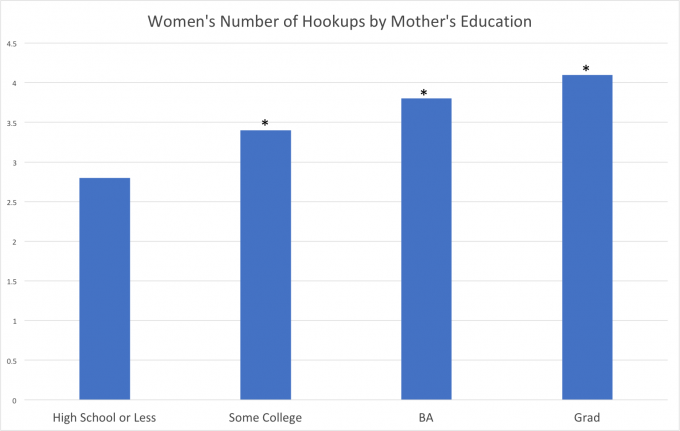
Men, like women, generally have more liberal sexual attitudes if their mothers have more education, as we saw above. However, in regards to sexual behavior, there are no significant differences by mother’s education in men’s number of hookups, or whether they have had sex outside an exclusive relationship (see the table in the appendix below). As the graph below shows, the men with the most educated mothers actually had slightly fewer sexual partners; an estimated 2.7 sex partners compared to 3.1 for men whose mothers have no more than a high school degree.
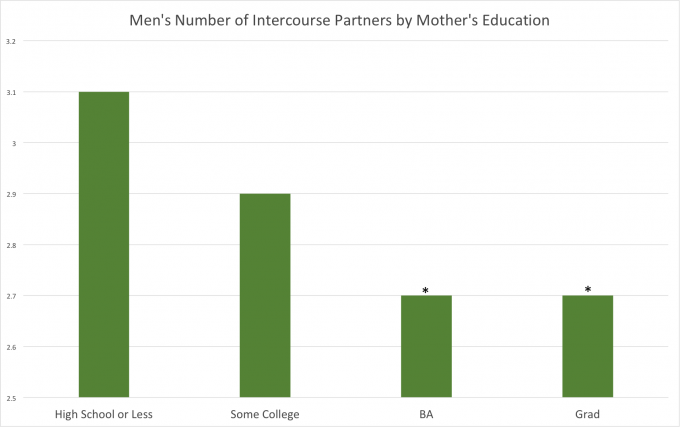
Educational Aspirations and Sexual Behavior
Neither men nor women with higher educational aspirations have significantly more or fewer hookups than their counterparts with lower aspirations. On the other two behavioral measures, men and women with higher aspirations are less experienced. As the graph below shows, men and women with higher aspirations report having had intercourse with slightly, but significantly, fewer partners.
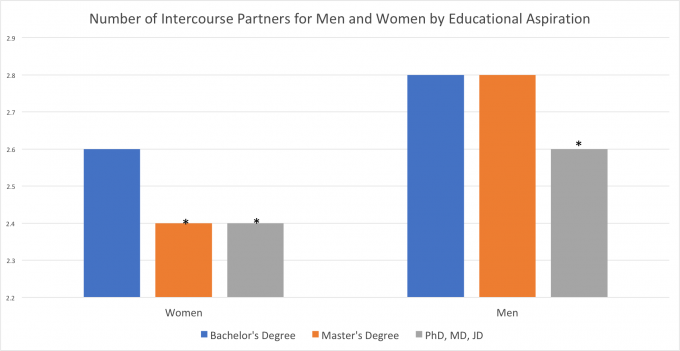
Regarding whether students have ever had sex outside a relationship, for both men and women, those with higher aspirations were less likely to have had sex outside an exclusive relationship, although the differences were modest. As the graph below shows, for women, 43% for those aspiring to the most versus 46% for those aspiring to the least education had had sex outside an exclusive relationship, and the analogous percents for men are 49% and 46%.
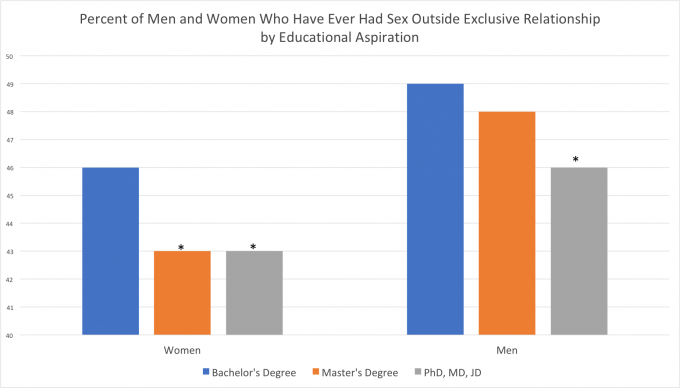
Summary: How Social Class (Retrospective and Prospective) Is Associated With Sexual Attitudes and Behavior
We explored whether students from more privileged social backgrounds or who aspire to higher education are more permissive, more restrictive, or neither, in their sexual attitudes and behaviors.
We found that, after controlling for age, and combinations of race and immigrant status, both men and women whose mothers had more education generally have more permissive attitudes on most, but not all items. Most effects are quite small, but the attitude showing the biggest differences is whether or not students believe that sex with a same-sex partner is wrong. The study didn’t ask for the student’s father’s education, but we feel confident that, had we obtained this measure, we would have found similar results for father’s as we found for mother’s education. This is because of the strong tendency of highly educated women tend to be married to highly educated men.
In looking for effects of students’ educational aspirations on their attitudes, we controlled for their mother’s education, because it is one important determinant of students’ aspirations and ultimate education. We wanted to know whether students with different educational aspirations, and thus, possibly different future attainments, differ in attitudes when we compare students with the same mother’s education (and the same age, and combination of race and immigrant status). Overall, there was no clear pattern. The largest difference was that men aspiring to more education are much less likely to think that sex with same-sex partners is wrong, although there was no such difference for women.
What about behavior? Although women with more educated mothers have hooked up with more partners, there are no significant differences by mother’s education in women’s number of sexual intercourse partners or whether they have had sex outside an exclusive relationship. For men, there is no evidence whatsoever of more liberal sexual behavior among those with more educated mothers, and, in fact, those with the most educated mothers have slightly fewer sexual intercourse partners. Those with higher educational aspirations, men and women, have slightly fewer sexual partners and are less likely to have had sex outside an exclusive relationship.
In sum, having a more advantaged class background is associated with somewhat more permissive attitudes about sex for both men and women, but somewhat more restrictive sexual behavior for men. Students’ own educational aspirations have no clear link to either more or less restrictive attitudes, but those with the highest aspirations are slightly less sexually active.
Sammy Wu is an undergraduate sociology major, Emma Mishel is a doctoral student in sociology, and Paula England is a professor of sociology. All are at New York University.
Technical Appendix: The OCSLS, our Statistical Procedures, and Table of Results
We used data from the Online College Social Life Survey (OCSLS). The OCSLS surveyed over 20,000 students from 21 four-year colleges and universities between 2005 and 2011. The survey had participants answer questions about their experiences with sex, dating, relationships, and hooking up, as well as their attitudes about certain sexual behaviors. The colleges and universities where the survey was administered were both private and public. The majority were a “flagship” state university. In terms of year in school, they were 35% freshmen, 23% sophomores, 20% juniors, and 17% in their fourth or higher year in school. We removed the small percent of students over 24 years of age from the sample.
A limitation of the OCSLS survey is that participants surveyed did not come from a probability sample. But, because the instructors in the (predominantly sociology) courses hosting the survey gave students extra credit, participation in these classes was nearly 100%. Thus, any non-representativeness of the sample is likely caused by the schools chosen and the kinds of students in the hosting courses, not who decided to participate within classes. Also helpful to the representativeness of the sample is the fact that, although the hosting classes were mostly sociology, only approximately 10% of respondents were sociology majors.
We were interested in social class differences in sexual attitudes and behavior, and the OCSLS had two relevant measures. To measure background socioeconomic status it asked mother’s education. This was coded as high school or less, some college, BA, and graduate degree. (Mother’s rather than father’s education was chosen since a significant share of students didn’t grow up with their father, and when he was present, his education is moderately positively correlated with his wife’s.) It also asked respondents how much education they intended to complete, and, insofar as those who go farther in school typically end up with more status and income, it can be seen as a measure of prospective class. We coded it into no more than BA, MA, and highest category combining PhD, MD, and JD.
Models intended to ascertain the effect of mother’s education (or other aspects of family background it represents) included indicator variables for mother’s education and the following control variables all operationalized via indicator variables: age (variables representing ages 18 to 24), race/ethnicity (White, Black, Hispanic, South Asian, East Asian, other), immigrant status (whether the student is an immigrant, the son/daughter of immigrants, or neither), and interactions between the race/ethnicity and immigrant variables. With these interactions, the models control for each combination of race/ethnicity and immigration, i.e. whether someone is, for example, an East Asian first-generation immigrant, a student of East Asian descent whose family has been in the U.S. more than 3 generations, a Black second-generation immigrant, a White first-generation immigrant, etc.
Models intended to ascertain the effect of the student’s educational aspirations included the indicator variables representing aspirations mentioned above, as well as all the controls mentioned in the previous paragraph. In addition, they include mother’s education, which is an important determinant of a student’s own educational attainment. Thus, these models aim to isolate any difference that educational aspirations (or their antecedents) make among people who had the same class background as measured by mother’s education.
For each of the attitudinal items of interest, we dichotomized the response categories as explained in the post above. We estimated logistic regressions predicting the more restrictive response from our independent variable of interest and the controls mentioned in the paragraphs above.
One of the behavioral dependent variables, whether one has had sex outside an exclusive relationship, is a dichotomy (yes or no), so models predicting it were also logistic regressions. The other two behavioral dependent variables, number of people one has hooked up with, and number of intercourse partners, are count variables, although they were truncated at very high numbers. For these models, we used the negative binomial.
The regression models were then used, via the margins command in Stata, to obtain, for each category of each independent variable of interest, a predicted percent (that is, the probability times 100, in the case of logistic regressions) or a predicted count (in the case of negative binomial models). These predicted percents and counts are what are shown in the tables below, as well as in graphs above. For the count variables, we also estimated OLS models and obtained predicted means via the margins command, and results were similar so are not shown.
All models were estimated separately for men and women.
Researchers who wish to use the OCSLS data can contact Emma Mishel at ekm331@nyu.edu for information on how to download the data.
Tables giving the complete results are below:
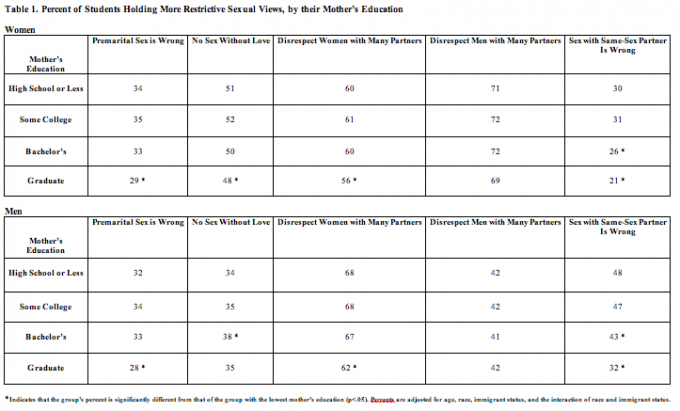
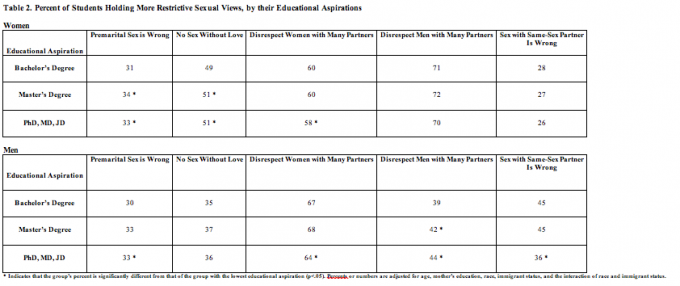
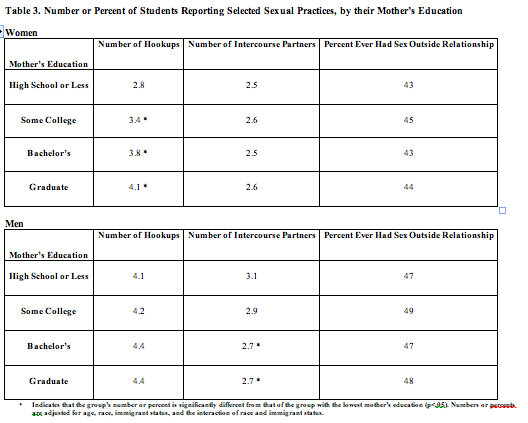
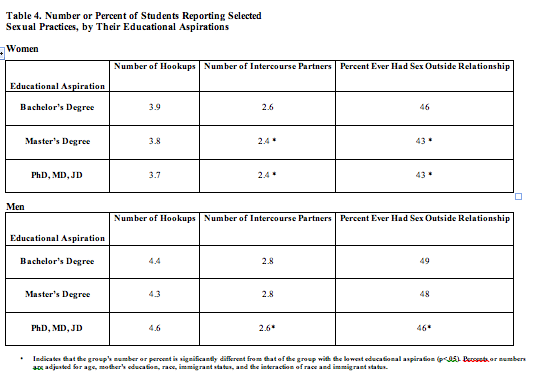

Comments 18
jenny
October 18, 2018this is the way you can get the chrome download online and it is the most helpful way in case you need chrome.
Shell90
May 2, 2019Hi there. It's really interesting article, i'm glad to read it. Especially i like this part: "Besides social class background, a person’s educational aspirations may play a role in their attitudes about sex, or their sexual behavior. Popular stereotypes are present here as well. ." It would be great if you share this information at https://pro-papers.com/blog/sociology-research-topics. I'll be thanksful.
LisaHickman
June 24, 2019This is a very hot topic on a modern campus. I think that we should speak openly about all social problems. This topic can be a topic for college assignments. If you are looking for the perfect service for writing assignments then read here https://sky-writer.com/blablawriting-review/ the reviews about various services such as blablawriting .
John
July 31, 2019Great info, please keep doing this type of content!
John
July 31, 2019https://contexts.org/blog/sex-and-social-class/comment-page-1/#comment-287895
John
July 31, 2019Nice article!
Hanna
August 13, 2019I hope that you will share more documents with us. fnaf sister location
Jenna
October 21, 2019I am actually surprised that premarital sex is viewed in a conservative way by collage students. OhMy
Darryl H. Alvarez
November 14, 2019It was a libel format blog and inside it people have very well explained how sex is becoming commonplace in school colleges nowadays and it is causing a lot of harm to the generation going forward but this https://icasinoreviews.info/online-baccarat-nz/ is really helpful for all gambler. And in my opinion we have to stop it as soon as possible otherwise the results are not good.
Grace Hudditon
January 17, 2020Thanks for cool ideas for my next article. I am a blogger. You can find my blog on https://elitewritings.com/essays/sociology. Enjoy reading it!
Edmond Lundquist
March 17, 2020Hey. I am a lazy student who loves a carefree life full of adventure and travel a lot. I like to contemplate the high mountains and wide seas. But with college homework, there is not always time to travel. The pro-papers.com helps me find free time for entertainment. They happily do it for me while I travel.
mika
May 5, 2020A lot of information is mentioned in your sharing, I appreciate your work. Let's continue with the more engaging posts.
vex
DeloresANorman
May 28, 2020Yes, it is right that background of family is the base of a student. Home is the first school for any student. Hey friends I was not so much good educated background and my English is not so good. I was about to suspended from college because of this. Then, I took an external writing help from https://www.ihatewritingessays.com/get-expelled. This site protect me from to get expelled from college. It gave me full write up by spending very less money. Their writers are very skilled and professional gave me best quality write up.
Afer1987
May 28, 2020Yes, it is right that the background of the family is the base of a student. Home is the first school for any student. Hey, friends, I was not so much good educated background and my English is not so good. I was about to suspend from college because of this. Then, I took an external writing help from https://www.ihatewritingessays.com/get-expelled. This site protects me from to get expelled from college. It gave me a full write up by spending very less money. Their writers are very skilled and professionals gave me the best quality write up.
Thomas
September 18, 2020What a detailed research. When I was a student I didn’t even think of such things. Young people nowadays grow faster than 10 years before. A lot of things have changed except stupid essays. I hated them a lot in the past. That’s why I used to order them from https://essaycheckup.com/speedypaper-review/. This service made my life so much easier.
kleopatra
October 22, 2020For a healthy and fulfilling life, we need a proper and healthy diet. And it is very important to do this from a young age. I bring to your attention a very useful page that will help you choose the right food for you, which will help you create a diet for you personally, with all the calories. Go over and eat right
https://healthy-food-near-me.com/cauliflower-how-is-it-useful-and-what-to-cook-with-it/
fireboy and watergirl
November 12, 2020Thanks for sharing. I found a lot of interesting information here. A really good post, very thankful and hopefully you will write more articles like this one.
coca
November 12, 2020My friend's blog I have read, I am very impressed with your blog, I hope you will have more blogs or more posts to bring readers
fireboy and watergirl